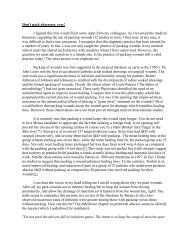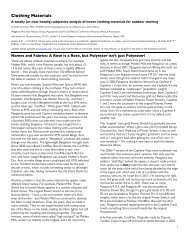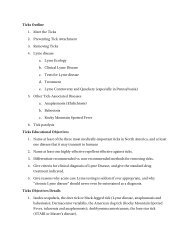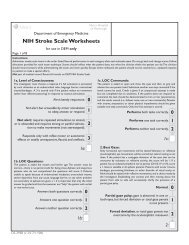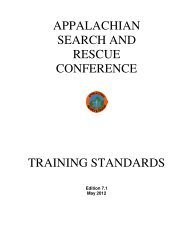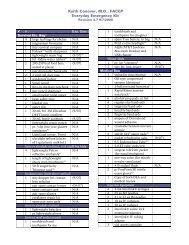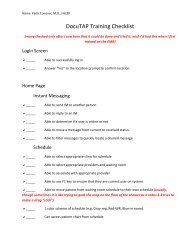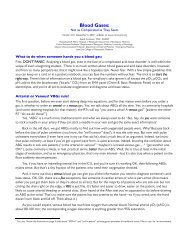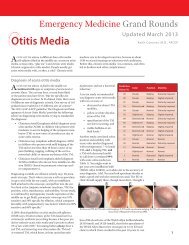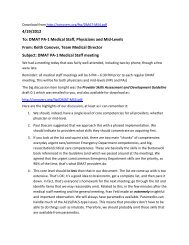“Against Medical Advice” (AMA) - Keith Conover's Home Page
“Against Medical Advice” (AMA) - Keith Conover's Home Page
“Against Medical Advice” (AMA) - Keith Conover's Home Page
You also want an ePaper? Increase the reach of your titles
YUMPU automatically turns print PDFs into web optimized ePapers that Google loves.
<strong>“Against</strong> <strong>Medical</strong> <strong>Advice”</strong> (<strong>AMA</strong>), Refusal of Transport,<br />
and Informed Consent<br />
<strong>Keith</strong> Conover, M.D., FACEP 1/29/2005<br />
Here are some notes I’ve taken about the issue of informed consent. This is<br />
directly related to the ED—where most of the case law about informed consent in<br />
emergencies originates—but also applies to EMS and SAR situations.<br />
As one lecturer put it, <strong>AMA</strong> or refusal of transport or refusal of care needs the<br />
following documented on the chart:<br />
1. CAPACITY: patient has the capacity (competence) to sign out<br />
2. TOLD: attending told patient of the diagnosis<br />
3. WHAT ELSE: What other reasonable alternatives can the patient pursue?<br />
4. OUTCOME: What might be the outcome if the patient signs out <strong>AMA</strong>?<br />
5. FAMILY: You have involved the family, if any, in the <strong>AMA</strong> process; have<br />
them sign chart, if possible.<br />
And, quoting from Emergency Department Law 1993;4(23), p. 8-7, relating to<br />
questions I posed after a particularly difficult night, with 2.5 inappropriate <strong>AMA</strong><br />
discharges from our hospital:<br />
"...What are the attendant duties and liabilities of medical restraint in the<br />
following not so atypical scenario? An elderly man is brought to the Ed by his<br />
family. When asked what the problem is, the man reveals no specific medical<br />
complaints except for 'being sick.' The man recalls something about throwing up<br />
blood, but says that it happened 'several days ago.'<br />
"The patient's vital signs are unremarkable, as is his physical exam, except for<br />
some mild epigastric tenderness. His stool is hemetest negative and his blood<br />
pressure shows no orthostatic instability. His answers to questions reveal no<br />
evidence of any overt psychiatric illness, but he is disoriented as to place and<br />
time.<br />
"According to the family and medical records, the patient had recently been<br />
admitted to the hospital with the diagnoses of alcohol intoxication, pancreatitis,<br />
and an upper GI bleed. He had been scheduled to be transferred to an alcohol<br />
detoxification center in three days. However, he had signed out from the<br />
hospital "Against <strong>Medical</strong> Advice" just three hours earlier.<br />
"The patient had walked about a block from the hospital, where he had been<br />
found collapsed in a snowdrift, confused and unable to walk. [by his family --KC]<br />
The cause of the confusion was not clear to the examiner, but it appeared to be<br />
alcohol withdrawal. [or the benzodiazepines he'd been given --KC]<br />
"During the process of re-admitting the patient to the hospital, his family<br />
expressed great concern that the patient had been allowed to leave the hospital,<br />
since he could have died of exposure. They expressed willingness to sign<br />
psychiatric commitment papers, but the emergency physician did not feel that the<br />
patient had any primary psychiatric problems. [N.B. -- in Pennsylvania, alcoholrelated<br />
problems are specifically excluded from the reasons you can use to<br />
involuntarily commit someone. --KC]<br />
"Should the patient be restrained in this situation? What are the legal risks and<br />
liabilities?<br />
"ANALYSIS: The analysis of any patient's situation should always begin with<br />
establishing what course of action is likely to promote his or her good health. In<br />
this case, wandering aimlessly in inclement weather was obviously not to the<br />
patients' advantage.<br />
"If weather is not a factor, is the patient able to care for his medical condition? Is<br />
he or she able to obtain and take medications and food? IS there someone<br />
willing to assist the patient? If there would be any doubt by a reasonable person<br />
[and those of us who work in the ED know this is an entirely fictional legal<br />
construct --KC] as to the patient's ability to care for him- or herself, at least there<br />
is a proper motivation to intervene. While the analysis does not stop here, this<br />
alone should be enough to defend against a charge of false imprisonment.<br />
"In fact, there may be liability if you do not act on the patient's behalf. In an<br />
emergency condition where the patient is unconscious, the patient has the right<br />
to presume consent to treatment. Failure to do so would undoubtedly result in a<br />
claim of negligence.<br />
"For example, one hospital found itself liable for the wrongful death of an<br />
intoxicated patient who had presented to the emergency department requesting<br />
help for this drinking problem. After making his request, the patient left the ED<br />
with another alcoholic and was struck by a car while attempting to cross a nearby<br />
highway. A court later found that once the patient present asking for assistance,<br />
the hospital had the duty to comply with that request until he regained the<br />
capacity to protect himself.<br />
"It is true that a physician must have the patient's consent for treatment, but<br />
consent is presumed when the patient is incompetent, then the right or<br />
responsibility to restrain a patient is determined by whether or not he or she has<br />
the ability to make an informed decision. The test is the same whether the<br />
patient is a Jehova's Witness who refuses life-saving blood or the fearful elderly<br />
person who refuses life-sustaining protective measures. If they lack capacity to<br />
make a truly informed decision, the physician is permitted, even obligated, to<br />
presume consent to treatment that is in the patient's best interest.<br />
<strong>AMA</strong>.DOC <strong>Page</strong> 1 of 2
"The legal capacity to consent or refuse consent can be reasonably<br />
determined by a four-prong test:<br />
"- Does the patient understand the relevant information?<br />
"- Does the patient have the ability to manipulate the information?<br />
"- Does the patient have the ability to make and communicate a choice?<br />
"- And finally, can the patient put all of these together to appreciatethe<br />
situation and its consequences?<br />
"The first test is one of simple understanding. If the patient cannot understand<br />
the danger, those that [sic] do have an obligation to protect him. Asking a<br />
patient to paraphrase what has been told to him can help assess this<br />
understanding better than asking him to simply regurgitate information. If a<br />
person is disoriented, it is hard to support a conclusion that they appreciate a<br />
personal danger<br />
"To determine whether a patient can successfully manipulate information, it is<br />
helpful to ask the patient about hypothetical situations based on what a rational<br />
person would do. In this way a person with normal capacity, but differing values,<br />
can demonstrate that understanding.<br />
"The third prong looks to whether the patient can make decisive choices.<br />
Differing responses within short periods suggest that the patients' capacity to<br />
organize his thoughts and choose a course of action is confused and unstable.<br />
[see Addendum below --KC] Patients who repeatedly change their minds should<br />
be protected until their decision-making process is stabilized.<br />
"The last prong entails the ability to appreciate the outcomes of their behavior<br />
and give reasons for their choices. The goal is to evaluate the patients' ability to<br />
do this, not to make value judgments based upon the choices.<br />
"The bottom line is exactly where we started. What is the best thing for the<br />
patient's health? If restraining a patient is the best way to ensure that outcome,<br />
then proceed with such, observing the normal precautions.<br />
"The advice to treat the patient as you would your own mother is a good<br />
guideline. The legal risk of behaving in this manner is one well worth taking."<br />
[from Mark Plaster, M.D., J.D., FACEP]<br />
[Addendum: on this same shift, another family brought in a woman, against her<br />
will, who also had just signed out <strong>AMA</strong> and found by the family in a bar drinking.<br />
She was alert, seemingly able to give a good history, smiling, cooperative, and<br />
ready to sign out again <strong>AMA</strong>. I was ready to let her, until I talked to the family,<br />
who said she had been nearly dead of hepatorenal syndrome, had severe liver<br />
failure, and had been told that if she drank again she would die. When I went<br />
back to her, she was still alert, smiling, and a good historian, but with a<br />
completely different history. She remembered nothing about having liver failure,<br />
or hepatorenal syndrome. She was a classic Korsakoff's glib confabulator. I<br />
admitted her against her will, on the grounds that based on her poor memory she<br />
wasn't capable of informed consent to an <strong>AMA</strong>. I called the magistrate for a<br />
restraining order.]<br />
[Addendum #2. A couple of hours before the end of my shift (which by this time<br />
I thought would never end) one of our (excellent) third-year internal medicine<br />
residents called me from the floor. He said his internal medicine attending had<br />
told him to let his patient sign out <strong>AMA</strong> but he had some questions and wanted<br />
to consult me first. (Nice when even the residents on the other services consult<br />
the emergency medicine attendings for advice.) I asked what the patient's<br />
medical problem was. He said DTs. I asked if the patient was hallucinating. He<br />
said yes. Only raising my voice a little (I was very proud of this at the time) I<br />
told him that, not to mention suing him for malpractice, I would personally<br />
strangle him if he let the patient sign out <strong>AMA</strong>. I explained the above and he<br />
called the magistrate. I suspect that by this time the magistrate was ready to<br />
strangle me.]<br />
Additional note: it is not necessary for medical professionals to call a magistrate<br />
except in exceptional circumstances, as when a family member, staff member, or<br />
the person’s lawyer contests the restraint. Note also that a drunk or otherwise<br />
incapacitated patient saying “I’ll sure your ass!” or “I wanna call my lawyer” does<br />
not require you to call either the magistrate or the person’s lawyer. (I have often<br />
considered letting drunks call their lawyers—after all if we have to deal with<br />
obnoxious drunks, why not their lawyers, too? But I’ve never done it.<br />
Final note: when teaching residents about <strong>AMA</strong>s, I always use the above stories<br />
to point out the following (view with nonproportional font):<br />
|-------------people who want to sign out <strong>AMA</strong>-------------------|<br />
|-people to let sign out <strong>AMA</strong>-| |-people to commit-| |---*****---|<br />
***** means there are people who want to sign <strong>AMA</strong> who don't meet the criteria<br />
for involuntary commitment, but who still shouldn't leave. Most are drunks who<br />
we just tell to shut up until they're sober; many threaten to sue and we just say<br />
"see you in court, shut up and behave." (Most apologize when they're finally<br />
sober and able to leave.) Ones that are more complex get "medical restraint."<br />
And if needed, a restraining order from a local magistrate who rules (legally) on<br />
their competence to sign out <strong>AMA</strong>.<br />
<strong>AMA</strong>.DOC <strong>Page</strong> 2 of 2



